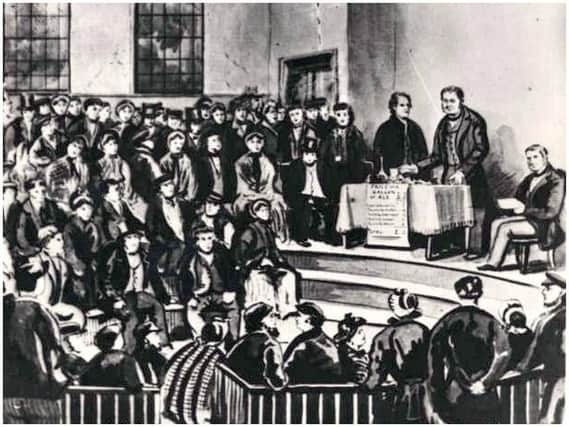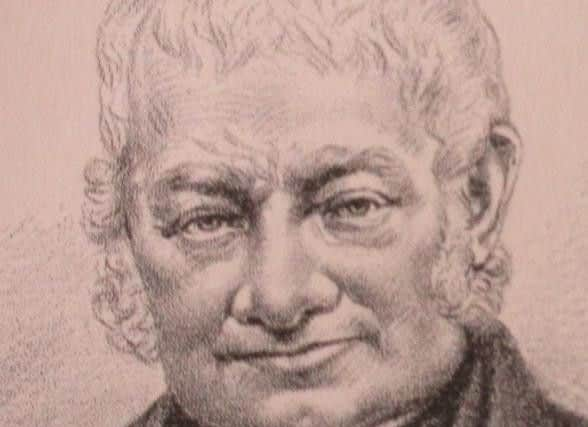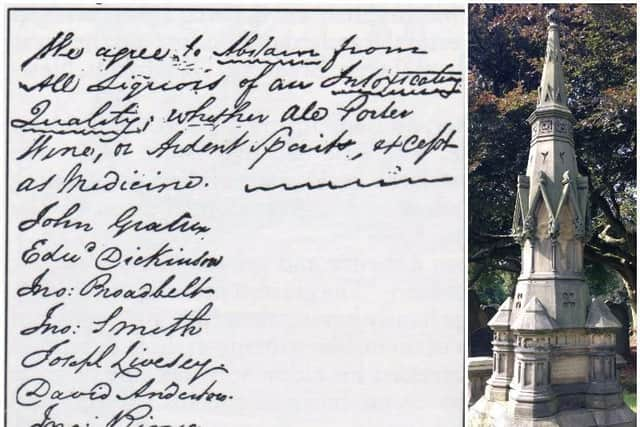Seven men who tried to banish drink


During the lifetime of Joseph Livesey, the great Temperance pioneer, it became a tradition that he would deliver an annual Temperance message to welcome the New Year.
Livesey never tired of campaigning despite the number of public houses or beer houses throughout the town having increased to more than 460 by the time he delivered his Temperance address for 1882, marking 50 years since the historic pledge of total abstinence was signed on the first day of September 1832 by the ‘Seven Men Of Preston’.
Advertisement
Hide AdAdvertisement
Hide AdThat heartfelt message in 1882 included a number of poignant phrases: “What a blessing if all the working men would take their wages home for the good of their families, instead of spending them upon drink!


“What happy homes we should have if mothers would cease sending their jugs for beer; if none of our females would ever call at the dram shop or beer shop, mothers and daughters setting a good example of sobriety, cleanliness, and good household management!
“What a delightful prospect we should have if our young men would cease to spend their time and money at the public house; if they would keep good company, and lodge their surplus wages in the Saving Bank!
“How cheering it would be to see friends congregated together on social occasions without intoxicating drink. It is the intoxicating cup that destroys the good order. At present, nearly all the time of our magistrates at the Petty Sessions is taken up with the crimes brought on by drink. If only the dirty, idle, drinking men who now disgrace our streets on Mondays would have spent the weekends with their families in sobriety. And if only the money spent with publicans was in the hands of the butchers, bakers, grocers and drapers.”
Advertisement
Hide AdAdvertisement
Hide AdMany choice phrases came from his lips and he concluded by urging that those who carried the Temperance message to continue the fight against ignorance.


The phrase ‘Seven Men of Preston’ you may well have heard and wondered who they were. To understand the significance of the phrase we have to go back to September 1832 when a gathering of local folk took place in the old Cockpit on Stoneygate.
It was a special meeting of the Preston Temperance Society to discuss the issue of total abstainers and moderate drinkers of malt liquors.
In the quaintly furnished amphitheatre, dimly lit by tallow candles, Joseph Livesey read his draft of the new total abstinence pledge and exclaimed, “Whose names shall I put down?”.
Advertisement
Hide AdAdvertisement
Hide AdNine days earlier Livesey and John King had met in Livesey’s cheese shop in Church Street and had drafted the pledge committing their lives to total abstinence. The historic pledge was signed by seven men and thus the great teetotalism movement was born. The seven who signed being John Gratix, Edward Dickinson, John Broadbelt, John Smith, Joseph Livesey, David Anderton and John King. The example set by these trail blazers was soon followed by thousands more, with 4,000 pledgers by 1834 in Preston alone, and the great teetotal movement was under way.


In truth, the contribution of the seven was significant, but of them it was mainly Livesey and King who rose to prominence along with others who emerged down the years. Richard ‘Dicky ‘ Turner would be credited with coining the phrase ‘tee-total’ after becoming a loyal follower of Livesey. He was a zealous companion of Livesey’s, even marching to London for the cause. He died in October 1846, aged 56.
The Temperance Movement spread their teachings throughout the land. The British Temperance League was on the move and almost 1,000 Temperance Societies were formed in Britain, with a membership of more than 300,000. Preston was certainly blessed with great orators and locally a number emerged who earned a place in history.
Thomas Swindlehurst was publicly crowned as ‘King Of The Reformed Drunkards’ in 1836 and a year later received a gold medal for his campaigning and his stirring public speaking gained many converts. He died in 1861, aged 77, and laboured to the last.
Advertisement
Hide AdAdvertisement
Hide AdJames Tearle was described as a fearless advocate of the campaign and was regarded by Joseph Livesey as an honest man who must be heard and he sustained his enthusiasm throughout his life. Born in 1804 he died in March 1868, aged 64.


John Finch, who began his campaigning in Liverpool, was a close friend of Joseph Livesey and they often shared a platform as they delivered their message of hope in towns and cities throughout Britain.
He was dubbed the ‘King of Teetotallers’ by those who heard him speak of the foolery of drink making and drink selling that led to the drunkard’s misfortunes. He died in 1857, aged 73, after driving back despair from the lives of many.
Henry Anderton, a saddler by trade, was another early recruit to the principles of the pledge and he became known as the ‘Temperance Poet’ whose lyrics presented a colourful picture of the drive towards teetotalism. He wore a silver star, as many of the preachers did, and his wit and humour led to many a new recruit joining the fold. He died in 1855, aged 46, and was buried in his Walton-le-Dale birthplace.
Advertisement
Hide AdAdvertisement
Hide AdJoseph Dearden was born in Woodcock’s Court, Preston in 1811 and signed the pledge within days of its introduction. His youthful enthusiasm was an example to many and in later years, besides working as a corporation beadle, he took up the role of historian for the society producing pamphlets and articles. He died in 1875, aged 63.
Also with youth on their side when they signed the pledge were George Toulmin and Thomas Walmsley who played a significant part in creating the Youth Temperance Society. Both came from poverty-stricken households yet emerged as leaders of men and great examples of a drink-free life.
Toulmin would go on to develop a life in the newspaper industry, including the launch of the ‘Lancashire Evening Post’ shortly before his death in February 1888. While Thomas Walmsley was a town councillor and mayor of the town during his long life of service.
And we must not forget Edward Grubb, a tailor by trade, who possessed the natural gift of oratory and taught many a young scholar about the folly of drinking and spoke passionately at the often crowded Temperance Hall. He spent over 50 years in Preston before he departed for Harrogate where he died in January 1891, aged 81.
Advertisement
Hide AdAdvertisement
Hide AdThere was always great interest in the original seven men and upon the death of Joseph Livesey in September 1884, in his 91st year, he received glowing tributes in the national newspapers of the day.
After all, he had produced many tracts and publications including a newspaper called ‘The Struggle’, he had been instrumental in encouraging temperance hotels to be opened and been honoured at the Crystal Palace in 1882 to celebrate 50 years of the Temperance Movement.
In January 1885 his fellow pledger John King, who was by trade a clogger, but for many years was station master at Ainsdale, Southport, died at the age 90. He had been born on Christmas Day 1795 at Walton-le-Dale and he was also the proud owner of a gold medal presented for his temperance activity and the setting up of such organisations elsewhere.
In December 1887 John Gratix, by trade an iron founder, made the newspaper headlines being the last of the ‘Seven Men Of Preston’ to die. He was in his 79th year and still living in Preston.
Advertisement
Hide AdAdvertisement
Hide AdIn Preston Cemetery there is a tall monument, erected in the 1850s, which commemorates the achievement of the men who committed themselves to ‘total abstinence from all intoxicating liquor’.
And to mark the centenary of the pledge in 1932 a commemorative service was held there and a crown of laurels was placed before it.
Did the efforts of those Temperance pioneers bear fruit? Well a century later in 1932 it was recorded that out of a population of 126,000 there were only 51 people prosecuted for drunkenness, and 26 of those were from out of town.